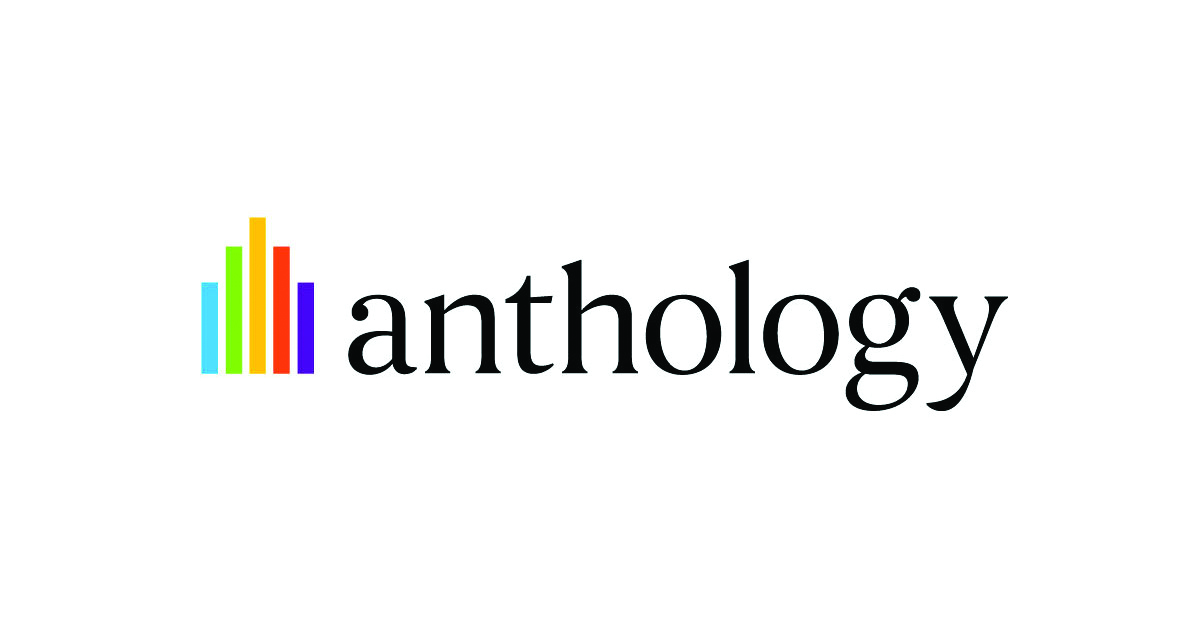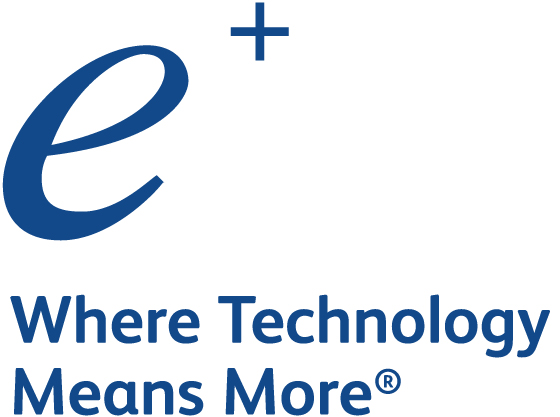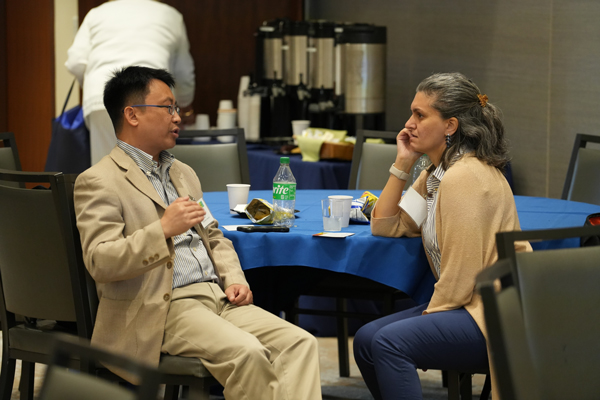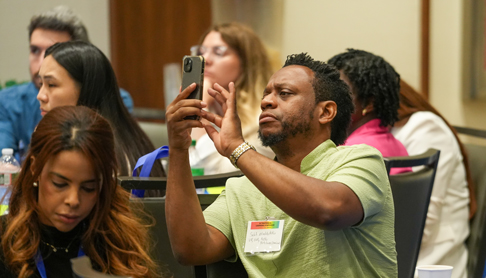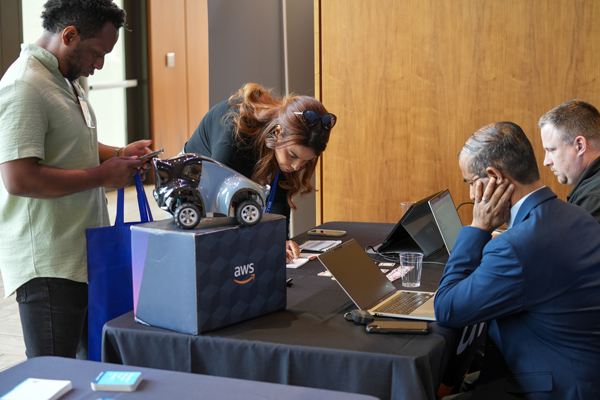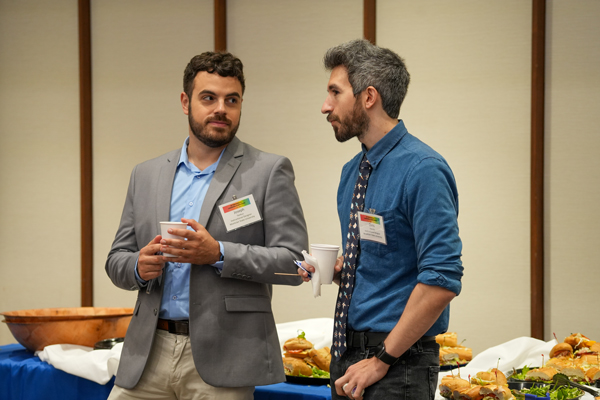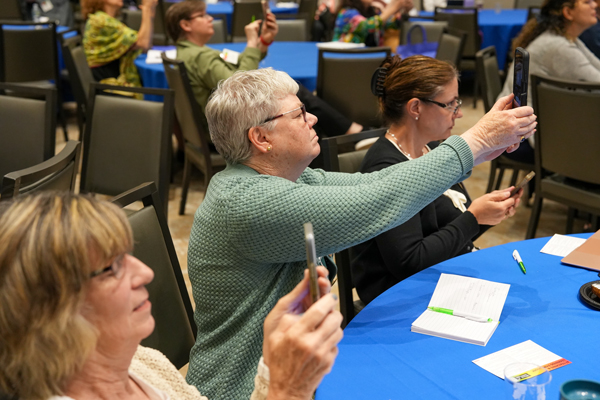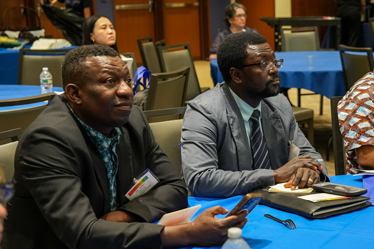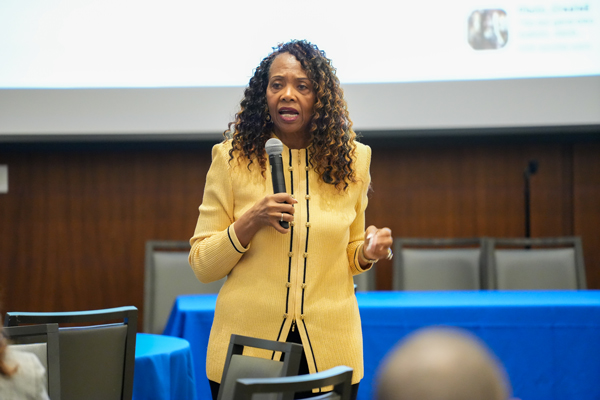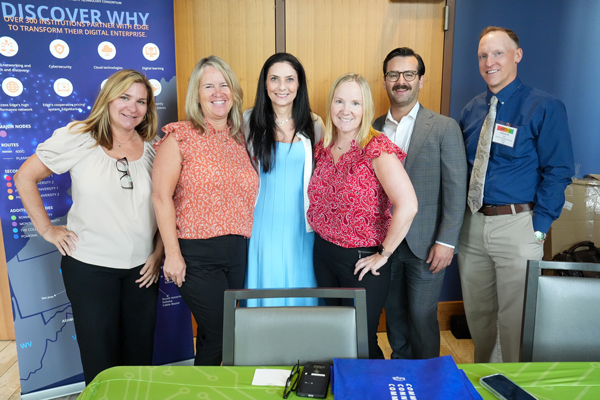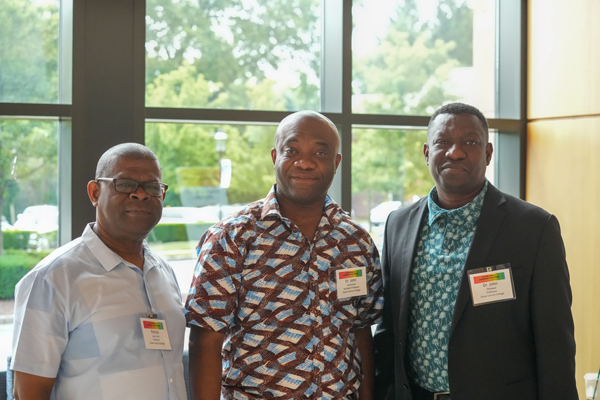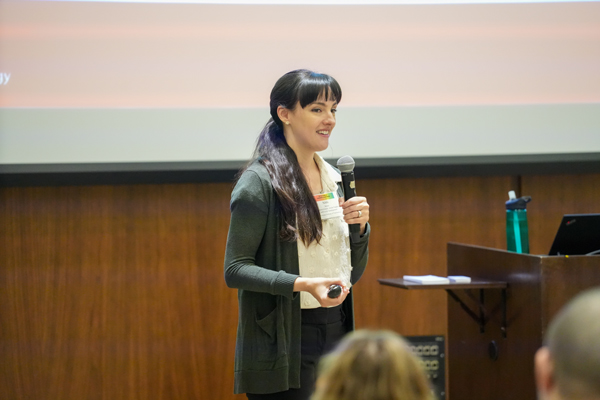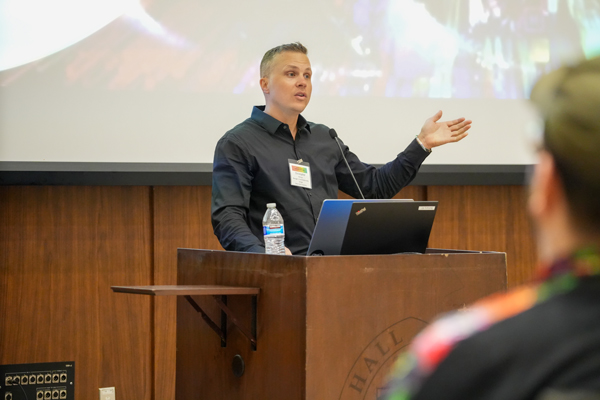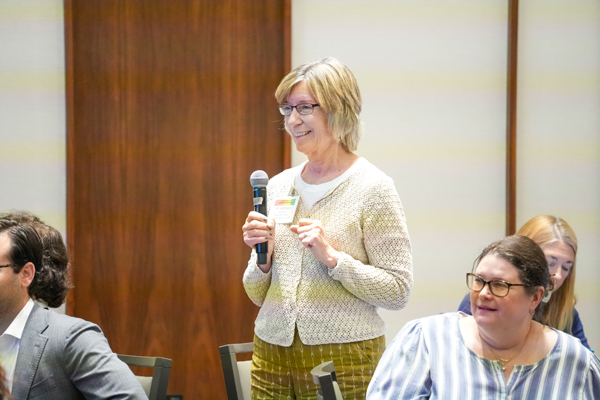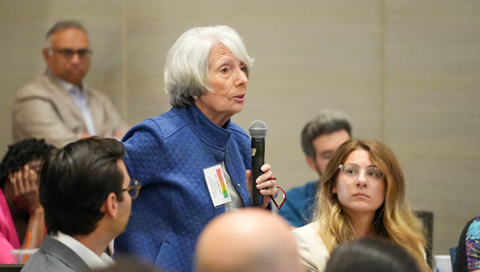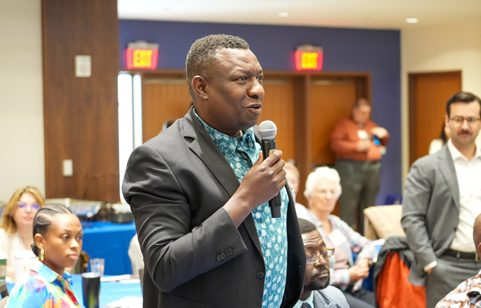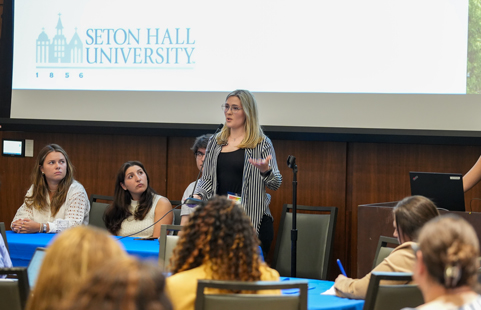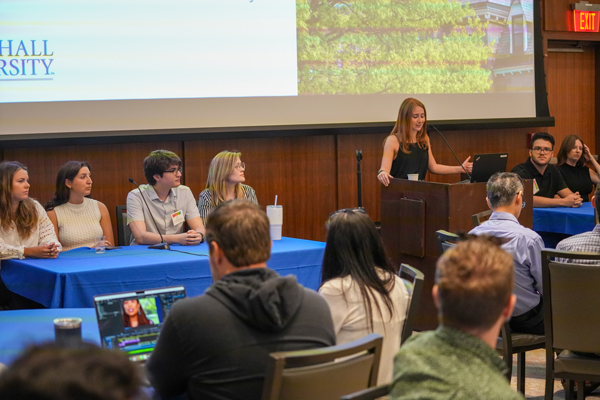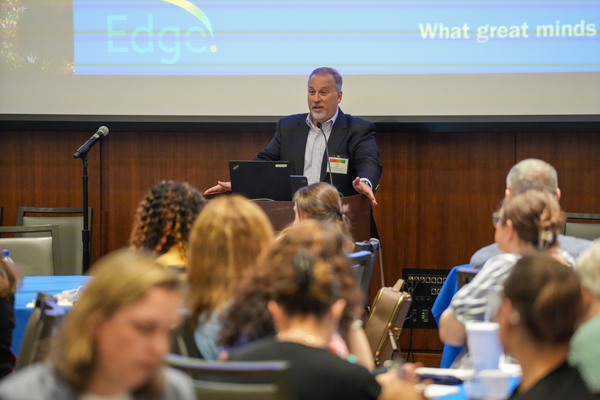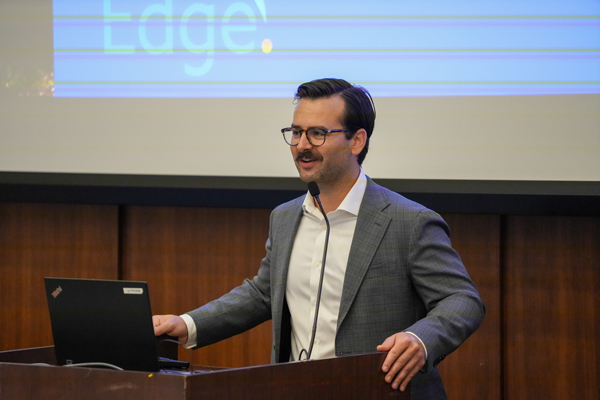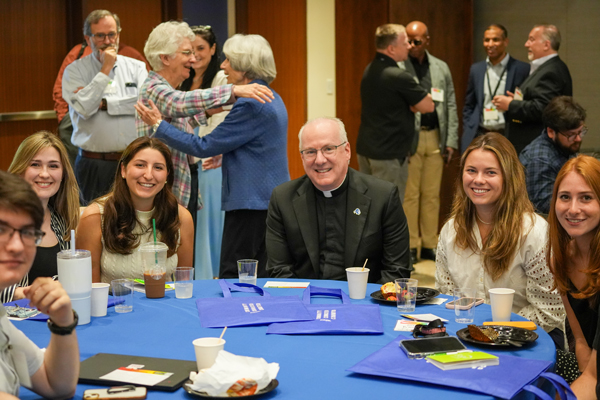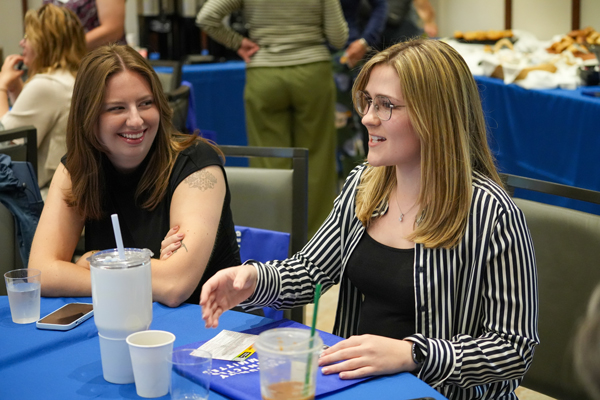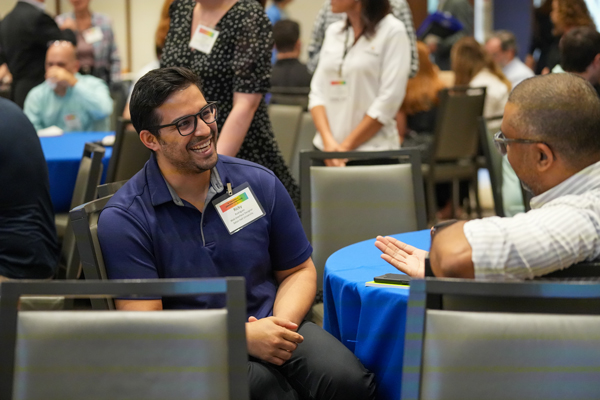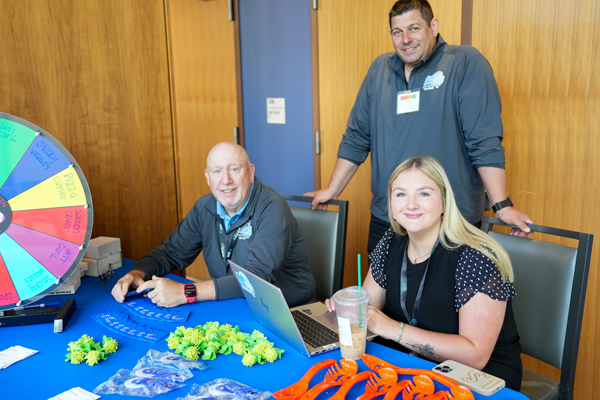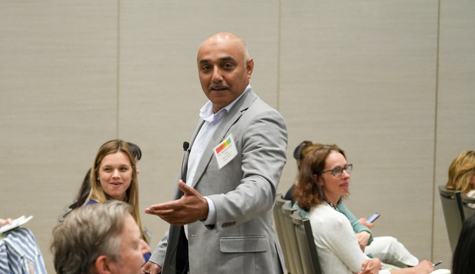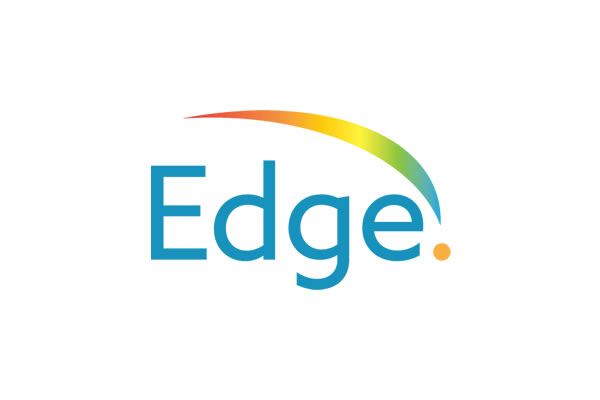
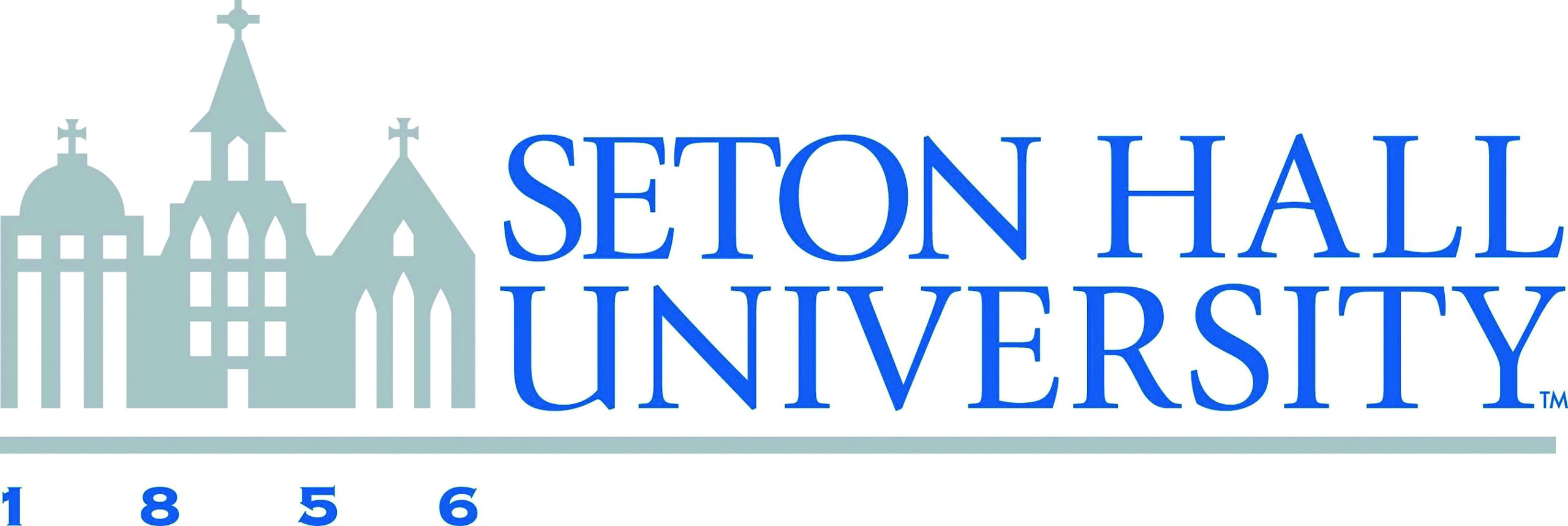
Edge and Seton Hall University hosted the inaugural AI Teaching & Learning Symposium on June 11, 2024, to explore the impact of AI on teaching, learning, and the student experience. The sold-out event was held at the University’s Bethany Hall and included a student panel, breakout sessions, lightning sessions, and the opportunity to connect with industry leaders, exhibitors, and fellow members.
Engaging with Generative AI Tools
The day’s events kicked off with a student panel, Experiencing Generative AI Insights from the Legal Foundations of Business, Disruption, Technology & Law, and Advanced Topics. Seton Hall University students, Thiago Alves, Filip Malesev, Kathleen Meagher, Victoria Torna, Nicole Voltmer, and Jasmine Patel, joined moderator, Julia Boivin, to discuss their experiences engaging with generative AI (GenAI) tools in their coursework and which applications, challenges, and outcomes they have encountered from integrating AI into student workflows. The panel shared a closer look at the courses and GenAI tools used and how the GenAI Journal helped enhance students’ understanding of AI technology.
During the session, the group also discussed AI’s potential in learning and its practical application in various projects, as well as insight into the development of skills in prompt engineering for AI interactions, specifically with ChatGPT. Students shared ways to communicate with AI effectively and ethically and how the technology can impact student creativity and problem-solving skills through AI-assisted analysis and brainstorming. In recounting their experiences, the group also explained the technical and ethical challenges that were encountered, the strategies that improved the effectiveness of using AI in their coursework, and how these tools could positively impact academic performance and engagement. Most importantly, the student panel reflected on how the experience has prepared them for an AI-driven professional landscape and what they see for AI’s role in their future careers.
“This was one of the best conferences/symposiums I have ever attended. Every session was exceptional. The energy was extremely positive!”
— Kate S., Instructional Designer
Empowering Personalized Learning with AI
The integration of AI and generative AI in higher education is revolutionizing student learning, teaching, and research. To explore this topic more in depth, Sergio Ortega, Business Development Lead for Artificial Intelligence/Machine Learning Worldwide Public Sector, Amazon Web Services, led the afternoon session, Industry Perspectives: Empowering Personalized Learning and Innovation with AI in Education. The presentation discussed how Amazon Web Services (AWS) is empowering universities to leverage these technologies to create personalized learning experiences, automate administrative tasks, and drive innovation.
The session looked at the potential of AI to analyze student data and provide personalized recommendations, as well as using GenAI tools to create customized learning materials that adapt to each student’s learning style and pace. Ortega examined how AI and generative AI can streamline administrative tasks, such as grading and course scheduling; helping to free up time for faculty to focus on teaching and research. Participants learned how AWS is supporting research and innovation in higher education by providing the infrastructure and tools necessary to analyze large datasets, identify patterns and trends, and develop new insights and theories.
Attendees of the symposium also had the opportunity to attend lightning sessions, which were shortened presentations exploring certain topics. The breakfast presentation, Adobe’s Perspective on Gen AI, was led by Stephen Hart, Principal Customer Manager, Adobe Education – New York, and reviewed some of Adobe’s most recent AI offerings, including the company’s ethical approach to creation and discovery. The lunch lightning session, Navigating AI in Higher Education: Engaging Faculty and Enhancing Student Success, delved into the transformative impact of AI in higher education, focusing on faculty engagement, student support, and learning journeys.
Presenters, Cole Galyon, Vice President, Academic Innovation, Anthology, and Dr. Jae Kim, Senior Instructional Designer, William Paterson University, explored how they used the insights and feedback from faculty to create a multifaceted approach to AI adoption across campuses and how it was designed to address both opportunities and challenges. Participants experienced a live demonstration of the AI Design Assistant found within Blackboard Learn, and how this tool has the potential to streamline administrative tasks and enhance educational outcomes. Dr. Kim explained how the University is leveraging Blackboard Learn Ultra to foster an interactive learning environment that empowers faculty and supports student success.
“The content covered in the conference was excellent and very helpful.”
— Patrick S., Professor
The Transformative Impact of Generative AI Tools
Christopher Petruzzi, Manager, User Interface and Multimedia Design, Seton Hall University, led the breakout session, Enhancing Creative Workflows with Generative AI in Adobe Photoshop, to discuss the transformative impact of GenAI tools in Adobe Photoshop. With two decades of Photoshop experience, Petruzzi has witnessed numerous advancements from Adobe and has seen how technology has enhanced both the creative/editing applications within higher education, specifically at Seton Hall University’s Teaching, Learning and Technology Center (TLTC).
The introduction of generative AI into Adobe Photoshop has revolutionized the institution’s Digital Media Team’s workflow by automating routine tasks such as image corrections and creations. Petruzzi shared how these advancements have not only accelerated their project timelines, but also expanded their creative possibilities. Attendees gained an in-depth look at how these AI tools have altered Seton Hall’s digital workflows—improving efficiency and allowing for the production of more complex and creative outputs.
With a live demonstration of key generative AI features within Adobe Photoshop, Petruzzi illustrated their practical applications which have been instrumental in enhancing workflows at the TLTC. The audience saw how AI-enhanced tools are used in real-world scenarios to fix, create, and enhance images, and how they are useful for producing high-quality content and marketing materials.
The Impact of ChatGPT on First-Year Writing
Redefining the Write Path: Exploring the Impact of Generative AI on First-Year Writing Education, presented by Nikki Bosca, Associate Director, Online Teaching and Course Development, New Jersey Institute of Technology (NJIT), shared the impact of ChatGPT on their First-Year Writing (FYW) courses. Taking the audience through their case study, Bosca showed how the research was anchored by an integrated framework drawing from Cognitive Process and Sociocultural Theories of Writing, and addressed four central questions examining perceptions, challenges, and opportunities for integrating generative AI into FYW instruction.
Utilizing a multiple methods case study approach, including interviews and surveys, the study provided nuanced insights into the dynamics of ChatGPT integration. Bosca explained how preliminary findings revealed diverse perspectives among instructors and students, which have challenged prevailing opinions on generative AI in student writing. As ChatGPT becomes more prevalent, this research has informed effective AI utilization that does not compromise the quality of student learning in FYW courses.
“The student panel was excellent! I found the agenda on the postcard super useful! It kept me off my devices. Overall it was a pleasure attending. Thanks so much for your efforts!”
— Elizabeth P., Senior Instructional Designer
Keeping Up with GenAI at Montclair State University
In January 2023, the instructional design team at Montclair State University began ideating a response to the advances in AI. Since then, Instructional Technology and Design Services (ITDS) has produced a suite of web-based resources, workshops and trainings, and consultations to guide their faculty through discovery and exploration of GenAI and how it can be leveraged pedagogically and ethically. In this session, The Amazing Race: Keeping Up with GenAI at Montclair State University, Montclair instructional designers, Joe Yankus and Gina Policastro, shared their experience composing these resources and facilitating small and large-group faculty development, as well as their lessons learned and the goals for the upcoming year.
The Transformative Potential of GenAI in Higher Education
John Shannon, Professor, Seton Hall University, and Susan A. O’Sullivan-Gavin, Professor, Rider University, joined together to present, Integrating Generative AI in Higher Education Learning Environments: Opportunities and Challenges. The presentation explored the transformative potential of GenAI and how it can help enhance learning environments in higher education. Attendees received a comprehensive overview of the benefits, challenges, and best practices of incorporating GenAI at an institution and the importance of guiding students in its use to gain “AI fluency.”
The session examined the importance of integrating GenAI in modern teaching and learning and the ways this advanced technology can enhance personalized learning, critical thinking, and digital literacy. GenAI can also facilitate the development of innovative teaching methods, improve student engagement and outcomes. Presenters offered guidance on the use of GenAI ethically and effectively, including academic integrity and plagiarism concerns, and issues related to transparency, privacy, accessibility, bias, accuracy, security, and regulatory challenges.
Creating Meaningful Learning Environments
With a look at the innovative ways AI tools can be used in the classroom, Centering Students and Using AI within Meaningful Learning Environments, explored how instructors can use AI to engage students in active, collaborative, constructive, authentic, and goal-directed activities, while also achieving culturally responsive teaching. This student-centered approach enriches how AI tools are used within meaningful learning experiences and is achieved when teachers situate students’ lived experiences, frames of reference, and ways of being as resources for learning. Presenter, Manny Algarin, Director of Education, Ed.D. Candidate, New Jersey City University, shared a process for designing meaningful learning experiences, a list of AI tools that promote meaningful engagement, and a culturally responsive framework that advances meaningful technology integration.
Robbie Melton, Provost, Tennessee State University, led another interactive session called Convenience to Competence: A Spectrum for Purposeful AI Integration in Education. The presentation introduced educators to the Arrighi AI-C2 Utilization Spectrum, a framework for conceptualizing how learners develop skills and competencies through the purposeful integration of AI tools into education. Attendees also received an overview of the Spectrum’s five stages from basic use to autonomous innovation.
“It was a great symposium – a nice variety of sessions. One enhancement for breakfast would be to include a yogurt option for those have gluten free dietary restrictions. The fruit was fresh and delicious. Very nice campus and good presenters. Kudos to Seton Hall and Edge for a well executed event! Thank you.”
— Abigail H., Senior Technology Trainer
Harnessing the Power of AI
The afternoon breakout sessions included Universal Access Through AI: Leveraging AI for Inclusive Education, presented by Jaimie Dubuque, Teaching and Learning Technologist, Rider University. In this presentation, participants learned how AI can be leveraged in teaching and learning to enhance accessibility and the practical strategies for implementing AI in planning, assessing, and supporting students in higher education. The session also examined the potential impact of AI on IEPs and 504s.
Also looking at the unparalleled opportunities that AI can unlock in the classroom, Muhammad Hassan, Executive Director, Nancy Thompson Learning Commons, Kean University, led the breakout session, Revolutionize Classroom Learning with AI. The presentation discussed how AI-powered platforms can personalize learning content, recommend supplementary materials, and facilitate real-time feedback. Thompson shared ways AI can enable the curation of unique assessments tailored to individual learning objectives and contexts and that AI algorithms can analyze students’ performance data and preferences to design more relevant, relatable, and reflective assessments of real-world scenarios. By embracing AI in assessment design, Thompson said educators can cultivate critical thinking, creativity, and problem-solving skills while providing students with meaningful feedback and evaluation metrics.
In Lessons Learned, Actions Unleashed: Unlocking Our Potential, Diane Rubino, Adjunct Professor, New York University led a candid discussion of what worked well and the opportunities for growth in integrating AI tools at their institution. The collaborative conversation asked various questions, including what were the outcomes of new teaching methods used, what wisdom can we extract from decisions that didn’t quite work out, and what action items can we identify to address challenges and improve the learning environment for ourselves and our students.
Improving Student Readiness
The panel presentation, Using AI Avatar Patients to Increase Student Readiness, explored how AI can be used to help educators to prepare students to enter the workforce after graduation. Seton Hall University’s Leslie Rippon, Associate Professor, Department of Athletic Training, Genevieve Zipp, Professor, Program Director of Ph.D. in Health Sciences, and Lorene Cobb, Assistant Professor, Department of Physical Therapy, talked about the pedological design and implementation of AI avatar patients into healthcare interprofessional curricula. The session explored student readiness, which includes perceptions of knowledge, attitude, and ability, and how experiences are impacted by context-specific readiness.
Contextual readiness includes socio-political, community, organization, financial, and learning resources and opportunities that influence the experience. Presenters looked at how experiences should promote active learning and simulate real-world scenarios to foster student readiness appropriately. Developing and delivering real-world learning experiences can present many challenges, including contextual characteristics, limited space for hands-on engagement, increased staffing needs, scheduling conflicts, and costs associated with patient actors or experiential opportunities. The session highlighted how integrating AI and virtual reality (VR) can address these challenges and generate human-like content in response to complex and varied prompts. Attendees gained an inside look at the data on financial impact and students’ perceived readiness post-AI-VR experiences and the recommendations for future integration into the broader educational curriculum.
John Baldino, Director, Center for Teaching and Learning, Lackawanna College added to the discussion in Machine Morality: Ethical and Creative Uses of AI for Faculty and Students. The professional development workshop examined AI, its role in education, and the opportunities for students and teachers to use the emerging technology to enhance teaching and learning.
As AI continues to be at the forefront of strategic planning discussions within academia, Edge will further explore how advanced technology can improve institutional effectiveness, enhance teaching and learning, expand research capabilities, and shape the skill sets that will be essential in tomorrow’s workforce. Edge events like the AI Teaching & Learning Symposium provide exciting opportunities to bring together professionals, thought leaders, and industry experts who can share valuable insight into the latest technologies and how institutions can leverage real-life solutions on their campuses to help transform education.
Featured Sessions
9:35-10:35 a.m.
Bethany Hall Multipurpose Room C
This student-moderated panel will focus on their experiences engaging with generative AI tools in their coursework, emphasizing their applications, challenges, and outcomes. The insights are drawn from the Legal Foundations of Business, Disruption, Technology & Law, and Advanced Topics courses. The discussion will showcase practical applications of generative AI in learning environments, highlight the challenges faced and solutions students implement using AI tools, and describe the outcomes and learnings from integrating AI into student workflows.
The panel will offer an overview of the courses and generative AI tools used; discuss how the GenAI Journal enhanced students’ understanding of AI technology, its potential in learning, and its practical application in various projects; offer insight into the development of skills in prompt engineering for AI interactions, specifically with ChatGPT and understanding how to communicate with AI effectively and ethically; describe the impact on student creativity and problem-solving skills; recount the technical and ethical challenges encountered and strategies for effective use of AI in coursework; describe key takeaways from using generative AI tools and their impact on academic performance and engagement; discuss the increased creativity and ability to generate novel ideas using AI while improving problem-solving skills through AI-assisted analysis and brainstorming; reflect on how the experience has prepared students for an AI-driven professional landscape and AI’s role in their future careers.”
Moderator:
- Julia Boivin, Seton Hall University
Panelists:
- Thiago Alves, Seton Hall University
- Filip Malesev, Seton Hall University
- Kathleen Meagher, Seton Hall University
- Victoria Torna, Seton Hall University
- Nicole Voltmer, Seton Hall University
- Jasmine Patel, Seton Hall Universit
1:30 – 2:10 p.m.
Bethany Hall Multipurpose Room C
The integration of AI and generative AI in higher education is revolutionizing the way students learn, faculty teach, and research is conducted. This presentation will explore how Amazon Web Services (AWS) is empowering universities to leverage these technologies to create personalized learning experiences, automate administrative tasks, and drive innovation. We will discuss the potential of AI to analyze student data and provide personalized recommendations, as well as the use of generative AI to create customized learning materials that adapt to each student’s learning style and pace. Additionally, we will examine how AI and generative AI can streamline administrative tasks, such as grading and course scheduling, freeing up time for faculty to focus on teaching and research. The presentation will also highlight how AWS is supporting research and innovation in higher education by providing the infrastructure and tools necessary to analyze large datasets, identify patterns and trends, and develop new insights and theories. Overall, this presentation will demonstrate how the use of AI and generative AI in higher education is improving student outcomes, advancing the field of research, and transforming the way universities operate.
Presenter:
- Sergio Ortega, Business Development Lead for Artificial IntelligenceI/Machine Learning Worldwide Public Sector, Amazon Web Services
Bio: Sergio Ortega is an accomplished executive with 20+ years of experience in AI, machine learning, analytics, and public sector industries. He excels in driving organizational excellence, fostering inclusive cultures, and solving customer challenges. Sergio has 15+ years of experience in cloud computing, PaaS, SaaS, and solution selling, with expertise in program management and go-to-market strategies. Currently, he is the Business Development Lead for AI/ML WW Public Sector at Amazon Web Services. Previously, he held leadership roles at Microsoft, including Metaverse, IoT, Light Edge Azure Engineering Global GTM and Ecosystem Lead. Sergio holds advanced degrees in data science, business, computer science, and cybernetics. His extensive experience and academic credentials make him a valuable asset to any organization.
Lightning Sessions
9:00 – 9:20 a.m.
Bethany Hall Multipurpose Room C
Stephen will review some of Adobe’s most recent AI offerings including the company’s ethical approach to creation and discovery.
Presenter:
- Stephen Hart, Principal Customer Manager, Adobe Education – New York
12:45 – 1:05 p.m.
Bethany Hall Multipurpose Room C
This presentation will delve into the transformative impact of AI in higher education, focusing on faculty engagement, student support, and learning journeys. Drawing on insights and feedback from faculty, we will explore the multifaceted approach to AI adoption across campuses, addressing both opportunities and challenges. Participants will also experience a live demonstration of the AI Design Assistant found within Blackboard Learn, showcasing its potential to streamline administrative tasks and enhance educational outcomes. Attendees will also hear from William Paterson University and how they are leveraging Blackboard Learn Ultra to foster an interactive learning environment that empowers faculty and supports student success. This presentation aims to foster an interactive dialogue among attendees, encouraging sharing experiences and strategies for effectively integrating AI into higher education.
Presenters:
- Cole, Galyon, Vice President, Academic Innovation, Anthology
- Dr. Jae Kim, Senior Instructional Designer, William Paterson University
Breakout Sessions
Session 1: 10:45 – 11:25 a.m.
Bethany Hall Multipurpose Room A
Explore the transformative impact of Generative AI tools in Adobe Photoshop during this presentation. With two decades of Photoshop experience, I have witnessed numerous advancements from Adobe. What I was originally doing by hand with the primitive lasso tool of Photoshop 7.0 in 2002 (has it been that long?)…can now be done at the click of one button in the latest Creative Suite.
This technology has enhanced both the creative/editing applications within higher education, specifically at Seton Hall University’s Teaching, Learning and Technology Center.
The introduction of Generative AI into Adobe Photoshop has revolutionized our Digital Media Team’s workflow by automating routine tasks such as image corrections and creations. These advancements have not only accelerated our project timelines but also expanded our creative possibilities. This session will provide an in-depth look at how these AI tools have altered our digital workflows, improving efficiency and allowing for the production of more complex and creative outputs.
The presentation will include a live demonstration of key Generative AI features within Adobe Photoshop, illustrating their practical applications which have been instrumental in enhancing our workflow at the TLTC. Attendees will see how AI-enhanced tools are used in real-world scenarios to fix, create, and enhance images, useful for producing high-quality content and marketing materials.
This session is tailored for individuals eager to learn about the potential of AI in enhancing digital media production, specifically within the Adobe Creative Suite. By sharing practical examples and personal insights from years of experience, I aim to inspire attendees to integrate these innovative tools into their own workflows, pushing the boundaries of what is possible in educational technology.
It’s also just really cool to digitally insert a T-Rex in the middle of the campus green at the press of a button.
Presenter:
- Christopher Petruzzi, Manager, UI and Multimedia Design, Seton Hall University
Bethany Hall Multipurpose Room B
This case study explores the impact of ChatGPT on First-Year Writing (FYW) courses at a public university. Anchored by an integrated framework drawing from Cognitive Process and Sociocultural Theories of Writing, the research addresses four central questions examining perceptions, challenges, and opportunities for integrating generative AI into FYW instruction. Concerns range from academic integrity to student anxiety, with a focus on how instructors navigate AI-assisted assignments and the implications on the writing process and outcomes. Utilizing a multiple methods case study approach, including interviews and surveys, the study provides nuanced insights into the dynamics of ChatGPT integration. Preliminary findings reveal diverse perspectives among instructors and students, challenging prevailing opinions on generative AI in student writing. As ChatGPT becomes more prevalent, this research informs effective utilization without compromising the quality of student learning in FYW courses.
Presenter:
- Nikki Bosca, Associate Director, Online Teaching and Course Development, New Jersey Institute of Technology
Bethany Hall Multipurpose Room C
In January 2023, the instructional design team at Montclair State University began ideating a response to the advances in artificial intelligence, which broke headlines in late 2022. Since then, Instructional Technology and Design Services (ITDS) has produced a suite of web-based resources, workshops and trainings, consultations, and more to guide University faculty through discovery and exploration of GenAI to be leveraged pedagogically and mitigate misuse. In this session, Montclair instructional designers Joe Yankus & Gina Policastro will share their experience composing these resources, facilitating small and large-group faculty development, lessons learned, and goals for the upcoming year.
Presenters:
- Joseph Yankus, Instructional Designer, Montclair State University
- Gina Policastro, Instructional Designer, Montclair State University
Session 2: 11:35 am – 12:15 p.m.
Bethany Multipurpose Room A
This presentation explores the transformative potential of Generative AI (GenAI) in higher education. It will address how GenAI can enhance learning environments, the importance of guiding students in its use, and best practices for its integration into university courses. The presentation will provide a comprehensive overview of the benefits and challenges of incorporating GenAI in higher education.
This presentation will examine the importance of integrating GenAI in modern teaching and learning; enhance of personalized learning, including critical thinking and digital literacy; facilitate the development of innovative teaching methods; improve student engagement and outcomes; provide students with guidance on the use of GenAI ethically and effectively including academic integrity and plagiarism concerns, issues related to transparency, privacy, accessibility, bias, accuracy, security, and regulatory challenges. Our presentation will also discuss the need for students to understand that “AI fluency” is as important as reading, writing, and arithmetic. The use of artificial intelligence (AI) has grown tremendously since the release of ChatGPT in November 2022. The daily avalanche of announced improvements to AI platforms increases the need for higher education to address these issues. These trends demand that we develop clear policies and guidelines encouraging student awareness, education, and fluency.
Presenter:
-
John Shannon, Professor, Seton Hall University
-
Susan A. O’Sullivan-Gavin, Professor, Rider University
Bethany Multipurpose Room B
“How can AI be used to enhance meaningful learning environments in culturally responsive ways? This session focuses on innovative ways AI tools can be used in the classroom to support meaningful learning experiences and culturally responsive teaching. When designing meaningful learning experiences, teachers use AI to engage students in activities that are active, collaborative, constructive, authentic, and goal directed. Culturally responsive teaching is a student centered approach that enriches how AI tools are used within meaningful learning experiences.This happens when teachers situate students’ lived experiences, frames of reference, and ways of being as resources for learning. Participants will be provided a process for designing meaningful learning experiences, a list of AI tools that promote meaningful engagement, and a culturally responsive framework that advances meaningful technology integration.
This session also addresses educational inequities that surface when learning experiences lack meaningfulness. Teacher centered practices have historically been related to passive technology use, deficit based beliefs about students’ potential, “one size fits all” instruction, and curricular choices that do not account for diversity. As a result, teacher centered approaches have and continue to perpetuate opportunity gaps that disproportionately impact students from historically marginalized communities. To bridge digital divides and fill opportunity gaps, participants will be exposed to the strategies, beliefs, conditions, and tools that support the shift towards student centeredness. “
Presenter:
- Manny Algarin, Director of Education, Ed. D. Candidate, New Jersey City University
Bethany Multipurpose Room C
This interactive presentation will introduce educators to the Arrighi AI-C2 Utilization Spectrum – a framework for conceptualizing how learners develop skills and competencies through the purposeful integration of AI tools into education. The presentation will provide an overview of the Spectrum’s five stages from basic use to autonomous innovation.
Presenter:
- Robbie Melton, Provost, Tennessee State University
Session 3: 2:20 – 3:00 p.m.
Bethany Multipurpose Room A
In this session, participants will learn how AI can be leveraged in teaching and learning to enhance accessibility. We will explore practical strategies for implementing AI in planning, assessing, and supporting students in higher education. During the session, we will also consider the potential impact of AI on IEPs and 504s.
Presenter:
- Jaimie Dubuque, Teaching and Learning Technologist, Rider University
Bethany Multipurpose Room B
In today’s rapidly evolving educational landscape, harnessing the power of Artificial Intelligence (AI) presents unparalleled opportunities to enhance learning experiences in the classroom. AI offers many tools and technologies that can dynamically adapt to students’ learning styles, preferences, and abilities. AI-powered platforms can personalize learning content, recommend supplementary materials, and facilitate real-time feedback. AI fosters an interactive and immersive learning environment that promotes active engagement and participation among students. AI presents a transformative way to enable the curation of unique assessments tailored to individual learning objectives and contexts. AI algorithms can analyze students’ performance data and preferences to design more relevant, relatable, and reflective assessments of real-world scenarios. Assessments developed using AI can incorporate multimedia elements, simulations, and gamification techniques to create interactive and engaging assessment experiences. By embracing AI in assessment design, educators can cultivate critical thinking, creativity, and problem-solving skills while providing students with meaningful feedback and evaluation metrics.
Presenter:
- Muhammad Hassan, Executive Director, Nancy Thompson Learning Commons, Kean University
Bethany Multipurpose Room C
Let’s reflect on our AI work together. We’ll use a ‘retrospective’ (a project management tool) to candidly discuss what worked well and where we can grow. We’ll focus on solutions we can control and make this a fun, collaborative conversation. We’re looking for real solutions for real people.
Here are some questions to get us started…
- What were the outcomes of new teaching methods, tools, etc. used? Are there opportunities to refine or expand?
- Let’s talk silver linings. What wisdom can we extract from decisions that didn’t quite work out?
- Describe something you crushed! What made it a success?
- What action items can we identify to address challenges and improve the learning environment for ourselves and our students?
Even if you haven’t made any groundbreaking discoveries, join us anyway.
The session lead will share anonymized responses compiled into a toolkit after the conference.
Presenter:
- Diane Rubino, Adjunct Professor, New York University
Session 4: 3:10 – 3:50 p.m.
Bethany Multipurpose Room A
Educators need to prepare students to enter the workforce post-graduation. Student’s readiness, which includes perceptions of knowledge, attitude, and ability, manifests in one’s sense of self-efficacy and is influenced by experiences. Additionally, experiences are impacted by context-specific readiness. The Context and Implementation of Complex Interventions framework defines context as a set of characteristics and circumstances that are active, unique, and embedded in the experience. Contextual readiness includes socio-political, community, organization, financial, and learning resources and opportunities that influence the experience. Experiences should promote active learning and simulate real-world scenarios to foster student readiness appropriately. Developing and delivering real-world learning experiences presents many challenges, including contextual characteristics, limited space for hands-on engagement, increased staffing needs, scheduling conflicts, and costs associated with patient actors or experiential opportunities. Integrating Artificial Intelligence (AI) and Virtual Reality (VR) can address these challenges. AI is a computing system that can engage in human-like processes such as learning, synthesizing, self-correction, and data integration for complex processing tasks. AI technologies generate human-like content in response to complex and varied prompts and, blended with VR, immerse the user in simulated environments to make the experience more thoughtful and interactive, allowing for repeated practice to enhance skill development, conservation of resources, and cost-effectiveness.
This panel presentation will describe the pedological design and implementation of AI avatar patients into healthcare interprofessional curricula. It will present data on financial impact and students’ perceived readiness post-AI-VR experiences and offer recommendations for future integration into the broader educational curriculum.
Presenters:
- Leslie Rippon, Associate Professor, Department of Athletic Training, Seton Hall University
- Genevieve Zipp, Professor, Program Director of PhD in Health Sciences, Seton Hall University
- Lorene Cobb, Assistant Professor, Department of Physical Therapy, Seton Hall University
Bethany Multipurpose Room B
This professional development workshop examines artificial intelligence (AI) and its role in education. The session will go beyond the red-alert knee-jerk response of many educators and present opportunities for students and teachers to use the emerging technology to enhance teaching and learning.
Presenter:
- John Baldino, Director, Center for Teaching and Learning, Lackawanna College
Exhibitor Sponsors

